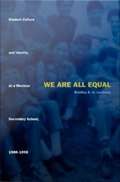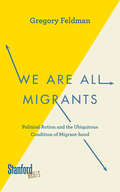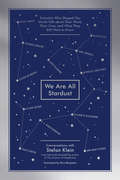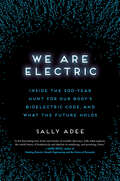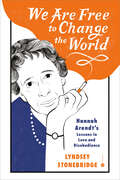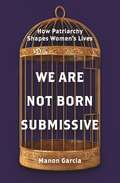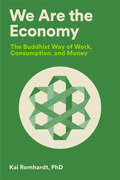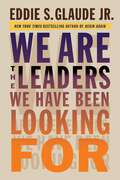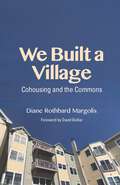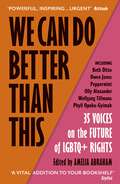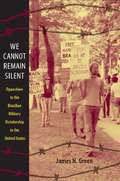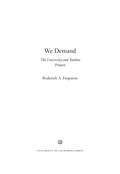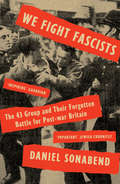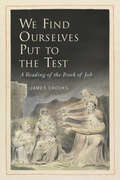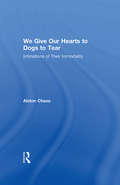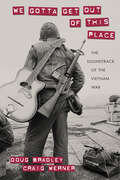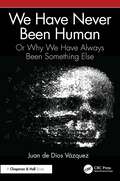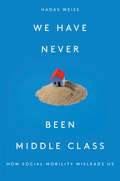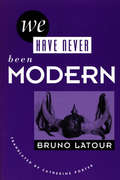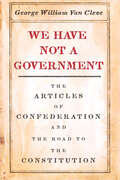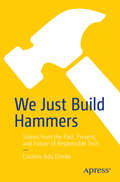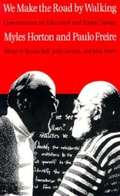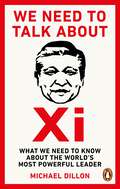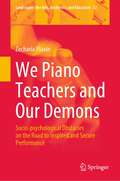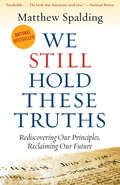- Table View
- List View
We Are All Equal: Student Culture and Identity at a Mexican Secondary School, 1988-1998
by Bradley A. U. LevinsonWe Are All Equal is the first full-length ethnography of a Mexican secondary school available in English. Bradley A. U. Levinson observes student life at a provincial Mexican junior high, often drawing on poignant and illuminating interviews, to study how the the school's powerful emphasis on equality, solidarity, and group unity dissuades the formation of polarized peer groups and affects students' eventual life trajectories. Exploring how students develop a cultural "game of equality" that enables them to identify--across typical class and social boundaries--with their peers, the school, and the nation, Levinson considers such issues as the organizational and discursive resources that students draw on to maintain this culture. He also engages cultural studies, media studies, and globalization theory to examine the impact of television, music, and homelife on the students and thereby better comprehend--and problematize--the educational project of the state. Finding that an ethic of solidarity is sometimes used to condemn students defined as different or uncooperative and that little attention is paid to accommodating the varied backgrounds of the students--including their connection to indigenous, peasant, or working class identities--Levinson reveals that their "schooled identity" often collapses in the context of migration to the United States or economic crisis in Mexico. Finally, he extends his study to trace whether the cultural game is reinforced or eroded after graduation as well as its influence relative to the forces of family, traditional gender roles, church, and global youth culture. We Are All Equal will be of particular interest to educators, sociologists, Latin Americanists, and anthropologists.
We Are All Migrants: Political Action and the Ubiquitous Condition of Migrant-hood
by Gregory FeldmanNow more than ever, questions of citizenship, migration, and political action dominate public debate. In this powerful and polemical book, Gregory Feldman argues that We Are All Migrants. By challenging the division between those considered "citizens" and "migrants," Feldman shows that both subjects confront disempowerment, uncertainty, and atomization inseparable from the rise of mass society, the isolation of the laboring individual, and the global proliferation of rationalized practices of security and production. Yet, this very atomization--the ubiquitous condition of migrant-hood--pushes the individual to ask an existential and profoundly political question: "do I matter in this world?" Feldman argues that for particular individuals to answer this question affirmatively, they must be empowered to jointly constitute the places they inhabit with others. Feldman ultimately argues that to overcome the condition of migrant-hood, people must be empowered to constitute their own sovereign spaces from their particular standpoints. Rather than base these spaces on categorical types of people, these spaces emerge only as particular people present themselves to each other while questioning how they should inhabit it.
We Are All Stardust: Scientists Who Shaped Our World Talk about Their Work, Their Lives, and What They Still Want to Know
by Ross Benjamin Stefan Klein“What distinguishes scientists, in your eyes?”—Stefan Klein“First and foremost, curiosity.”—Roald Hoffmann, Nobel Prize–winning chemistWhen Stefan Klein, an acclaimed journalist, sits down to talk with 18 of the world’s leading scientists, he finds they’re driven by, above all, curiosity. When they talk about their work, they turn to what’s next, to what they still hope to discover. And they see inspiration everywhere: From the sports car that physicist Steven Weinberg says helped him on his quest for “the theory of everything” to the jazz musicians who gave psychologist Alison Gopnik new insight into raising children, they reveal how their paradigm-changing work entwines with their lives outside the lab. We hear from extraordinary natural and social scientists, including:Evolutionary biologist Richard Dawkins on ego and selflessnessPrimatologist Jane Goodall on chimpanzee behaviorNeuroscientist V. S. Ramachandran on consciousnessGeographer Jared Diamond on chance in historyAnthropologist Sarah Hrdy on motherhoodAnd cosmologist Martin Rees on how “ultimately we ourselves are stardust.”
We Are Electric: Inside the 200-Year Hunt for Our Body's Bioelectric Code, and What the Future Holds
by Sally AdeeScience journalist Sally Adee breaks open the field of bioelectricity—the electric currents that run through our bodies and every living thing—its misunderstood history, and why new discoveries will lead to new ways around antibiotic resistance, cleared arteries, and new ways to combat cancer. You may be familiar with the idea of our body's biome: the bacterial fauna that populate our gut and can so profoundly affect our health. In We Are Electric we cross into new scientific understanding: discovering your body's electrome. Every cell in our bodies—bones, skin, nerves, muscle—has a voltage, like a tiny battery. It is the reason our brain can send signals to the rest of our body, how we develop in the womb, and why our body knows to heal itself from injury. When bioelectricity goes awry, illness, deformity, and cancer can result. But if we can control or correct this bioelectricity, the implications for our health are remarkable: an undo switch for cancer that could flip malignant cells back into healthy ones; the ability to regenerate cells, organs, even limbs; to slow aging and so much more. The next scientific frontier might be decrypting the bioelectric code, much the way we did the genetic code. Yet the field is still emerging from two centuries of skepticism and entanglement with medical quackery, all stemming from an 18th-century scientific war about the nature of electricity between Luigi Galvani (father of bioelectricity, famous for shocking frogs) and Alessandro Volta (inventor of the battery). In We Are Electric, award-winning science writer Sally Adee takes readers through the thrilling history of bioelectricity and into the future: from the Victorian medical charlatans claiming to use electricity to cure everything from paralysis to diarrhea, to the advances helped along by the giant axons of squids, and finally to the brain implants and electric drugs that await us—and the moral implications therein. The bioelectric revolution starts here.
We Are Free to Change the World: Hannah Arendt's Lessons in Love and Disobedience
by Lyndsey StonebridgeA timely guide on how to live—and think—through the challenges of our century drawn from the life and thought of political theorist Hannah Arendt, one of the twentieth century&’s foremost opponents of totalitarianism&“We are free to change the world and to start something new in it.&”—Hannah ArendtThe violent unease of today&’s world would have been familiar to Hannah Arendt. Tyranny, occupation, disenchantment, post-truth politics, conspiracy theories, racism, mass migration: She lived through them all.Born in the first decade of the last century, she escaped fascist Europe to make a new life for herself in America, where she became one of its most influential—and controversial—public intellectuals. She wrote about power and terror, exile and love, and above all, about freedom. Questioning—thinking—was her first defense against tyranny. She advocated a politics of action and plurality, courage and, when necessary, disobedience.We Are Free to Change the World is a book about the Arendt we need for the twenty-first century. It tells us how and why Arendt came to think the way she did, and how to think when our own politics goes off the rails. Both a guide to Arendt&’s life and work, and its dialogue with our troubled present, We Are Free to Change the World is an urgent call for us to think, as Hannah Arendt did—unflinchingly, lovingly, and defiantly—through our own unpredictable times.
We Are Not Born Submissive: How Patriarchy Shapes Women's Lives
by Manon GarciaA philosophical exploration of female submission, using insights from feminist thinkers—especially Simone de Beauvoir—to reveal the complexities of women’s reality and lived experienceWhat role do women play in the perpetuation of patriarchy? On the one hand, popular media urges women to be independent, outspoken, and career-minded. Yet, this same media glorifies a specific, sometimes voluntary, female submissiveness as a source of satisfaction. In philosophy, even less has been said on why women submit to men and the discussion has been equally contradictory—submission has traditionally been considered a vice or pathology, but female submission has been valorized as innate to women’s nature. Is there a way to explore female submission in all of its complexity—not denying its appeal in certain instances, and not buying into an antifeminist, sexist, or misogynistic perspective?We Are Not Born Submissive offers the first in-depth philosophical exploration of female submission, focusing on the thinking of Simone de Beauvoir, and more recent work in feminist philosophy, epistemology, and political theory. Manon Garcia argues that to comprehend female submission, we must invert how we examine power and see it from the woman’s point of view. Historically, philosophers, psychoanalysts, and even some radical feminists have conflated femininity and submission. Garcia demonstrates that only through the lens of women’s lived experiences—their economic, social, and political situations—and how women adapt their preferences to maintain their own well-being, can we understand the ways in which gender hierarchies in society shape women’s experiences. Ultimately, she asserts that women do not actively choose submission. Rather, they consent to—and sometimes take pleasure in—what is prescribed to them through social norms within a patriarchy.Moving beyond the simplistic binary of natural destiny or moral vice, We Are Not Born Submissive takes a sophisticated look at how female submissiveness can be explained.
We Are the Economy: The Buddhist Way of Work, Consumption, and Money
by Kai RomhardtA no-nonsense Zen approach to our economic realities can change everything and help us regain our freedom. Is it possible to be personally fulfilled, and also make a difference within our current financial system? If you're skeptical, business coach and Zen practitioner Kai Romhardt proposes a minimalist, awareness-based strategy that totally reconfigures our core economic relationships: work, consumption, and money.How do we do that? We need to pause, breathe, and get in touch with our true intentions. Too often, we think of the economy as something outside of us, as beyond the scope of our individual choices. We're unhappy with how things are going, with unthinking growth that polarizes our world and condenses wealth at the top, but we don't know what to do. Romhardt argues that individuals who wield a sharp Buddhist mindset can, in fact, create change through personal decisions: when we can see in to society, and in to our constructs, we become empowered to choose deeply real and purposeful lives.
We Are the Leaders We Have Been Looking For (The W. E. B. Du Bois Lectures)
by Eddie Glaude Jr.From the author of the New York Times bestseller Begin Again, a politically astute, lyrical meditation on how ordinary people can shake off their reliance on a small group of professional politicians and assume responsibility for what it takes to achieve a more just and perfect democracy.“Like attending a jazz concert with all of one’s favorite musicians…James Baldwin, Martin Luther King, Jr., Malcolm X, Ella Baker, Toni Morrison, and more…Glaude brilliantly takes us on an epic tour through their lives and work.”―Henry Louis Gates, Jr., author of The Black Box: Writing the RaceWe are more than the circumstances of our lives, and what we do matters. In We Are the Leaders We Have Been Looking For, one of the nation’s preeminent scholars and a New York Times bestselling author, Eddie S. Glaude Jr., makes the case that the hard work of becoming a better person should be a critical feature of Black politics. Through virtuoso interpretations of Martin Luther King, Jr., Malcolm X, and Ella Baker, Glaude shows how we have the power to be the heroes that our democracy so desperately requires.Based on the Du Bois Lectures delivered at Harvard University, the book begins with Glaude’s unease with the Obama years. He felt then, and does even more urgently now, that the excitement around the Obama presidency constrained our politics as we turned to yet another prophet-like figure. He examines his personal history and the traditions that both shape and overwhelm his own voice.Glaude weaves anecdotes about his evolving views on Black politics together with the writings of Ralph Waldo Emerson, John Dewey, Toni Morrison, James Baldwin, and Ralph Ellison, encouraging us to reflect on the lessons of these great thinkers and address imaginatively the challenges of our day in voices uniquely our own.Narrated with passion and philosophical intensity, this book is a powerful reminder that if American democracy is to survive, we must step out from under the shadows of past giants to build a better society—one that derives its strength from the pew, not the pulpit.
We Built a Village: Cohousing and the Commons
by Diane Rothbard MargolisDescribes the development of one of the first cohousing communities in the U.S. offering a social understanding of its commons.Cohousing, a form of communal living that clusters around shared common space, began about a half century ago in Denmark. We Built a Village describes the process of planning and building of an early cohousing community in Cambridge, Massachusetts, and the way the people involved simultaneously built their homes and their social structure. As both a memoir and a sociological analysis that probes the differences between commons and markets, it is unique among books about cohousing. When this group of people began in the late 1990s to construct their cohousing community, they set in motion a counterpoint between the physical spaces and the social configurations that would guide their lives together, even up to creative responses to the recent pandemic.
We Can Do Better Than This: An urgent manifesto for how we can shape a better world for LGBTQ+ people
by Beth Ditto Owen Jones Peppermint Olly Alexander Wolfgang Tillmans Phyll Opoku-GyimahHow do we shape a better world for LGBTQ+ people? Olly Alexander, Peppermint, Owen Jones, Beth Ditto, Shon Faye and more share their stories and visions for the future.'A vital addition to your bookshelf' Stylist, 5 Books for Summer'Captivating... A must-read' Gay Times, Books of the YearIn We Can Do Better Than This, 35 voices - actors, musicians, writers, artists and activists - answer this vital question, at a time when the queer community continues to suffer discrimination and extreme violence. Through deeply moving stories and provocative new arguments on safety and visibility, dating and gender, care and community, they present a powerful manifesto for how - together - we can change lives everywhere.'Powerful, inspiring...urgent' Attitude'Read and be inspired' Peter Tatchell'Illuminating' Paul Mendez, author of Rainbow Milk'Friendly and fierce' Jeremy Atherton Lin, author of Gay Bar
We Cannot Remain Silent: Opposition to the Brazilian Military Dictatorship in the United States
by James N. GreenIn 1964, Brazil's democratically elected, left-wing government was ousted in a coup and replaced by a military junta. The Johnson administration quickly recognized the new government. The U. S. press and members of Congress were nearly unanimous in their support of the "revolution" and the coup leaders' anticommunist agenda. Few Americans were aware of the human rights abuses perpetrated by Brazil's new regime. By 1969, a small group of academics, clergy, Brazilian exiles, and political activists had begun to educate the American public about the violent repression in Brazil and mobilize opposition to the dictatorship. By 1974, most informed political activists in the United States associated the Brazilian government with its torture chambers. In We Cannot Remain Silent, James N. Green analyzes the U. S. grassroots activities against torture in Brazil, and the ways those efforts helped to create a new discourse about human-rights violations in Latin America. He explains how the campaign against Brazil's dictatorship laid the groundwork for subsequent U. S. movements against human rights abuses in Chile, Uruguay, Argentina, and Central America. Green interviewed many of the activists who educated journalists, government officials, and the public about the abuses taking place under the Brazilian dictatorship. Drawing on those interviews and archival research from Brazil and the United States, he describes the creation of a network of activists with international connections, the documentation of systematic torture and repression, and the cultivation of Congressional allies and the press. Those efforts helped to expose the terror of the dictatorship and undermine U. S. support for the regime. Against the background of the political and social changes of the 1960s and 1970s, Green tells the story of a decentralized, international grassroots movement that effectively challenged U. S. foreign policy.
We Demand: The University and Student Protests
by Roderick A. FergusonThis title is part of American Studies Now and available as an e-book first. Visit ucpress.edu/go/americanstudiesnow to learn more. In the post–World War II period, students rebelled against the archaic university. In student-led movements, they fought for the new kinds of public the university needed to serve—women, minorities, immigrants, indigenous people, and more—with a success that had a profound impact on the intellectual landscape of the twentieth century. Because of their efforts, ethnic studies, women’s studies, and American studies were born, and minority communities have become more visible and important to academic debate. Less than fifty years since this pivotal shift in the academy, however, the university is fighting back. In We Demand, Roderick A. Ferguson shows how the university, particularly the public university, is moving away from “the people” in all their diversity. As more resources are put toward STEM education, humanities and interdisciplinary programs are being cut and shuttered. This has had a devastating effect on the pursuit of knowledge, and on interdisciplinary programs born from the hard work and effort of an earlier generation. This is not only a reactionary move against the social advances since the ’60s and ’70s, but part of the larger threat of anti-intellectualism in the United States.
We Fight Fascists: The 43 Group and Their Forgotten Battle for Post-war Britain
by Daniel SonabendThe extraordinary story of the Jewish ex-servicemen fighting fascism in post-war BritainReturning to civilian life, at the close of the Second World War, a group of Jewish veterans discovered that, for all their effort and sacrifice, their fight was not yet done. Creeping back onto the streets were Britain&’s homegrown fascists, directed from the shadows by Sir Oswald Mosley. Horrified that the authorities refused to act, forty-three Jewish exservicemen and women resolved to take matters into their own hands. In 1946, they founded the 43 Group and let it be known that they were willing to stop the far-right resurgence by any means necessary. Their numbers quickly swelled. Joining the battlehardened ex-servicemen in smashing up fascist meetings were younger Jews, including hairdresser Vidal Sassoon, and gentiles as well, some of whom volunteered to infiltrate fascist organisations. The Group published its own newspaper, conducted covert operations, and was able to muster a powerful force of hundreds of fighters who quickly turned fascist street meetings into mass brawls. The struggle peaked in the summer of 1947 with the Battle of Ridley Road, where thousands descended on the Hackney market to participate in weekly riots. The history of the 43 Group is not just a gripping story of a forgotten moment in Britain&’s post-war history; it is also a timely lesson in how to confront fascism—and how to win.
We Find Ourselves Put to the Test: A Reading of the Book of Job
by James CrooksDoes the world we inhabit offer us hospitality or indifference? This question is central to the spiritual literature of all cultures. In We Find Ourselves Put to the Test James Crooks returns to the Bible’s book of Job to explore the enduring relevance of that question and its philosophical dimensions. Beginning with the puzzle of Job’s famous stoicism and nihilism in the face of loss, Crooks explores the contradictions of suffering as dramatized in the dialogue between Job and his friends. How is it that the friends’ attempt to comfort Job with a rational explanation of his misfortune devolves seamlessly into victim blaming? How is it that Job’s own renunciation of life at the nadir of his pain converts into an intellectual patience that outlasts the advocates of rational explanation? We Find Ourselves Put to the Test gives a portrait of the suffering protagonist looking into the heart of a creation that is, by necessity, both indifferent and hospitable. A philosophical exploration of one of the most enigmatic books in the Bible, We Find Ourselves Put to the Test goes beyond critical interpretation and suggests a way of reading the book of Job that is animated by a consideration of the reader’s narratives and communities, and the limits of his or her own understanding.
We Give Our Hearts to Dogs to Tear: Intimations of Their Immortality
by Alston ChaseMore than a hauntingly beautiful memoir about small dogs in Big Sky country, this book is a wise account of the relationships among dogs, humans, and the land that surrounds them. It is the story of successive generations of Jack Russell terriers, their animal friends, and their human companions. Alston Chase searches for the immortality of dogs, what makes them unique companions, and why we humans willingly give them our hearts knowing that someday they will be broken. This book will resonate with anyone who has ever loved a dog.Chase muses that dogs are the embodiment of spirit over mortality and through the window of their brief lives we glimpse eternity. This eternal includes the Earth, the land, and the bonds forged between people and dogs over thousands of years. Chase sees threats in the decline of rural life, unbridled urbanization, and in dog breeders who judge by conformation to breed standards and fashion rather than ability and health.An uplifting tribute to the dogs we love, and a reflection on the limitations of life, this book shows a triumph of the spirit. Rich in poetic citations, it is an environmental cry for help, a naturalistic appreciation of a dissolving world, and a deeply spiritual reminder that nothing loved is ever lost.
We Gotta Get Out of This Place: The Soundtrack of the Vietnam War (Culture and Politics in the Cold War and Beyond)
by Craig Werner Doug Bradley&“The diversity of voices and songs reminds us that the home front and the battlefront are always connected and that music and war are deeply intertwined.&” —Heather Marie Stur, author of 21 Days to Baghdad For a Kentucky rifleman who spent his tour trudging through Vietnam&’s Central Highlands, it was Nancy Sinatra&’s &“These Boots Are Made for Walkin&’.&” For a black marine distraught over the assassination of Martin Luther King Jr., it was Aretha Franklin&’s &“Chain of Fools.&” And for countless other Vietnam vets, it was &“I Feel Like I&’m Fixin&’ to Die&” or the song that gives this book its title. In We Gotta Get Out of This Place, Doug Bradley and Craig Werner place popular music at the heart of the American experience in Vietnam. They explore how and why U.S. troops turned to music as a way of connecting to each other and the World back home and of coping with the complexities of the war they had been sent to fight. They also demonstrate that music was important for every group of Vietnam veterans—black and white, Latino and Native American, men and women, officers and &“grunts&”—whose personal reflections drive the book&’s narrative. Many of the voices are those of ordinary soldiers, airmen, seamen, and marines. But there are also &“solo&” pieces by veterans whose writings have shaped our understanding of the war—Karl Marlantes, Alfredo Vea, Yusef Komunyakaa, Bill Ehrhart, Arthur Flowers—as well as songwriters and performers whose music influenced soldiers&’ lives, including Eric Burdon, James Brown, Bruce Springsteen, Country Joe McDonald, and John Fogerty. Together their testimony taps into memories—individual and cultural—that capture a central if often overlooked component of the American war in Vietnam.
We Have Never Been Human: Or Why We Have Always Been Something Else
by Juan de Dios VázquezWe Have Never Been Human: Or Why We Have Always Been Something Else boldly reimagines what it means to be human, challenging the traditional notions that bind our identity to biology and culture. From ancient mythologies to modern technologies, this book reveals a dynamic, ever-evolving human identity shaped by external forces and technological advancements.Blending insights from philosophy, technology studies, anthropology, and cultural critique, We Have Never Been Human: Or Why We Have Been Something Else offers an interdisciplinary exploration of our constructed identities and what they portend for the future of society. It raises essential questions: How has technology reshaped our self-perception? Are humans fixed beings, or are we endlessly evolving? What ethical, social, and political challenges arise as we integrate with intelligent machines?This book is a compelling read for those intrigued by the intersection of humanity and technology, offering profound insights into the essence of what it means to be human—or perhaps, what it means to evolve beyond the human.
We Have Never Been Middle Class: How Social Mobility Misleads Us
by Hadas WeissTaking apart the ideology of the "middle class"Tidings of a shrinking middle class in one part of the world and its expansion in another absorb our attention, but seldom do we question the category itself. We Have Never Been Middle Class proposes that the middle class is an ideology. Tracing this ideology up to the age of financialization, it exposes the fallacy in the belief that we can all ascend or descend as a result of our aspirational and precautionary investments in property and education. Ethnographic accounts from Germany, Israel, the USA and elsewhere illustrate how this belief orients us, in our private lives as much as in our politics, toward accumulation-enhancing yet self-undermining goals. This original meshing of anthropology and critical theory elucidates capitalism by way of its archetypal actors.
We Have Never Been Modern
by Bruno LatourWith the rise of science, we moderns believe, the world changed irrevocably, separating us forever from our primitive, premodern ancestors. But if we were to let go of this fond conviction, Bruno Latour asks, what would the world look like? His book, an anthropology of science, shows us how much of modernity is actually a matter of faith. What does it mean to be modern? What difference does the scientific method make? The difference, Latour explains, is in our careful distinctions between nature and society, between human and thing, distinctions that our benighted ancestors, in their world of alchemy, astrology, and phrenology, never made. But alongside this purifying practice that defines modernity, there exists another seemingly contrary one: the construction of systems that mix politics, science, technology, and nature. The ozone debate is such a hybrid, in Latour's analysis, as are global warming, deforestation, even the idea of black holes. As these hybrids proliferate, the prospect of keeping nature and culture in their separate mental chambers becomes overwhelming--and rather than try, Latour suggests, we should rethink our distinctions, rethink the definition and constitution of modernity itself. His book offers a new explanation of science that finally recognizes the connections between nature and culture--and so, between our culture and others, past and present. Nothing short of a reworking of our mental landscape. We Have Never Been Modern blurs the boundaries among science, the humanities, and the social sciences to enhance understanding on all sides. A summation of the work of one of the most influential and provocative interpreters of science, it aims at saving what is good and valuable in modernity and replacing the rest with a broader, fairer, and finer sense of possibility.
We Have Not a Government: The Articles of Confederation and the Road to the Constitution
by George William Van CleveIn 1783, as the Revolutionary War came to a close, Alexander Hamilton resigned in disgust from the Continental Congress after it refused to consider a fundamental reform of the Articles of Confederation. Just four years later, that same government collapsed, and Congress grudgingly agreed to support the 1787 Philadelphia Constitutional Convention, which altered the Articles beyond recognition. What occurred during this remarkably brief interval to cause the Confederation to lose public confidence and inspire Americans to replace it with a dramatically more flexible and powerful government? We Have Not a Government is the story of this contentious moment in American history. In George William Van Cleve’s book, we encounter a sharply divided America. The Confederation faced massive war debts with virtually no authority to compel its members to pay them. It experienced punishing trade restrictions and strong resistance to American territorial expansion from powerful European governments. Bitter sectional divisions that deadlocked the Continental Congress arose from exploding western settlement. And a deep, long-lasting recession led to sharp controversies and social unrest across the country amid roiling debates over greatly increased taxes, debt relief, and paper money. Van Cleve shows how these remarkable stresses transformed the Confederation into a stalemate government and eventually led previously conflicting states, sections, and interest groups to advocate for a union powerful enough to govern a continental empire. Touching on the stories of a wide-ranging cast of characters—including John Adams, Patrick Henry, Daniel Shays, George Washington, and Thayendanegea—Van Cleve makes clear that it was the Confederation’s failures that created a political crisis and led to the 1787 Constitution. Clearly argued and superbly written, We Have Not a Government is a must-read history of this crucial period in our nation’s early life.
We Just Build Hammers: Stories from the Past, Present, and Future of Responsible Tech
by Coraline Ada EhmkePhilosopher Noam Chomsky is famously quoted as saying that technology is neither good nor bad, but simply a neutral tool. He likens it to a hammer, which can be used by carpenters and torturers alike. While the neutrality of tech is an idea that appeals to many technologists, this perspective is out of alignment with today's realities of pervasive ad-tech, surveillance capitalism, algorithmic manipulation, and rising techno-fascism. We Just Build Hammers applies a lens of speculative and science fiction to connect you with a historical lineage of thinkers and activists in the responsible tech movement. Its narrative spans a century of major technological upheavals: from the advent of the atomic age to the formative years of computing; from the hacker visionaries of the turn of the century to the tech justice revolutionaries of today. This book challenges technologists to consider for themselves whether they're really just "building hammers"– technologies whose potential for good balances their potential for harm– or if they are unwittingly contributing to systems that exacerbate inequality, inequity, and injustice. What You Will Learn A historic grounding and a science fiction perspective to help untangle the difficult and fraught topic of tech ethics Ways to bring ethical considerations into the development of new technologies How to navigate the increasing complexity of the techno-social world we live and work in Who This Book is For Designed to appeal broadly, not just to engineers and technologists, but to anyone interested in the history and future of ethics and technology.
We Make the Road by Walking: Conversations on Education and Social Change
by Myles Horton Paulo Freire Brenda Bell John Gaventa John PetersIn December 1987, Myles Horton and Paulo Freire, two pioneers of education for social change, came together to "talk a book" about their experiences and ideas. Though they came from different environments--one from the rural mountains of Appalachia, the other from São Paulo, the largest industrial city in Brazil--Myles and Paulo shared a vision and a history of using participatory education as a crucible for empowerment of the poor and powerless.
We Need To Talk About Xi: What we need to know about the world’s most powerful leader
by Michael DillonMeet the most powerful leader in the world. Chinese premier Xi Jinping graces our television screens and news headlines on a regular basis. But even after a decade in power, he remains shrouded in mystery.From growing up with a father purged in Mao's Cultural Revolution and his mission to eradicate poverty, to his persecution of Uyghur Muslims and paranoia about being likened to Winnie-the-Pooh, Xi Jinping is a man obscured by caricatures. In this short, essential primer, historian and writer Michael Dillon unveils the character of Xi Jinping - arguably the world's most powerful man - to truly understand his grip on China, what he wants and how the West gets him wrong.But this is not just the story of Xi; this is the story of today's largest economic powerhouse, which dives into the crux of the issue - what does Xi's leadership of China mean for the rest of the world, and what will he do next?
We Piano Teachers and Our Demons: Socio-psychological Obstacles on the Road to Inspired and Secure Performance (Landscapes: the Arts, Aesthetics, and Education #32)
by Zecharia PlavinThis book focuses on piano teachers and the many pains they encounter in their careers. These pains play an essential role in blocking the musical inspiration of their students. The author identifies with the sensitivities of the teachers, aiming at the inspiration permeated and safer playing of their students.The book penetrates the protective mechanisms of the teachers that, on the one hand, maintain their professional functioning, while on the other hand, block refreshing ideas. It combines exploration of secure and culturally informed inspired playing, coping with exaggerated anxiety and understanding the interaction of piano actions with pianist’s physiology.This book helps to open teachers’ perceptions of the ways to enable more secure and more inspired performances while remembering the inner feelings of the piano teachers.
We Still Hold These Truths
by Matthew SpaldingThe Essential Guide to Rolling Back the Progressive Assault and Putting America Back on CourseMany Americans are concerned, frightened, angry. The country, it seems, is on the wrong track.But what is the right course for America? Knowing what we stand against is not the same as knowing what we stand for.Just in time, Matthew Spalding provides the plan for translating angst into proper action in this bestselling book. We Still Hold These Truths offers a bracing analysis of how and why we have lost our bearings as a nation and lays out the strategy to rescue our future from arbitrary and unlimited government.
